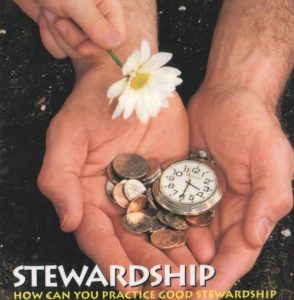Dimensions of Holistic Stewardship
Stewardship is whatever we do by our actions with all that God has entrusted to us.
For Example:
Our Common Talents and Purpose – Love God with all your mind, heart, soul, and strength, and love your neighbor as [you  love] yourself (Mark 12:30-31)
love] yourself (Mark 12:30-31)
Heart: the direction in which my life leans; our passion(s) for life and particular slant
Soul: our authentic selves “in the image of God,” in relation to / in covenant with God
Strength: the wonder, fitness, and use of our bodies; our physical abilities and limitations
Mind: our ability to think, reason, and imagine; mindset / attitude toward God, others, life
1 Corinthians 6:19-20; Matthew 22:34-40; Matthew 5:2-16 etc.
Firstfruits Living – Giving to God the first and the best of all God has given us and managing all the rest according to God’s generosity. See Lynn Miller, Firstfruits Living, Mark Vincent A Christian View of Money. Includes giving the first of:
Each day in prayer and devotions
Each week in gathering for worship as a community
Our relationships in our church and neighboring community (can extend to world community)
Our income in financial giving out of income and assets; planned giving.
Deuteronomy 26:1-2,10; Exodus 23:16,19; 34:22; Leviticus 23:10; Numbers 18:13; 28:26; etc.
The Earth and All Creatures – Do no harm and do good for the whole web of creation! See Earth Trek.
Psalm 104; Isaiah 40:12-31; Genesis 1:1-31 [dominion, not domination]; Psalm 24:1-2 etc.
Our Families and Faith Formation – Generational stewardship: teaching and learning from our children, youth, and seniors about holistic stewardship; practicing stewardship together. See Delia Halverson, Let the Children Give.
Money – Intentionality and generosity in our earning, saving, spending, and giving
Firstfruits living, fiscal management, budgeting, socially responsible investing, funding the church, narrative budgets, planned giving. See Nathan Dungan, Money Sanity Solutions; Gary Moore Faithful Finances 101. Can include (non-judgmental, non-magic) tithing, but firstfruits living is broader. See Adam Hamilton’s six key financial principles. Matthew 6:24-34; 23:23; 1 Timothy 6:6-10; Hebrews 13:5
The Gift of Community –personal relationships; one-on-one within our faith community, in the community where we live, and in the human community around the globe; includes local and global mission engagement.
Deuteronomy 15:9; 24:14; Matthew 25:31-46; Romans 12:15; Ephesians 4:1-7; Philippians 2:1-11
The Gift of Time –
Chronos: living with the past, dealing with our present, attitude and planning for the future
Kairos: living in the moment, God’s interruptions / presence, surprised by the divine in our ordinary days
Aion: Big Picture living in the light of eternity; God’s purposes and goals for us all.
Our Spiritual Gifts – Personal abilities and passions for involvement (“service/ministry”). See Patricia Brown, SpiritGifts. I Corinthians 12:4-11; Romans 12:3-8; Ephesians 4:11-16 (illustrative, not comprehensive)
The Gift of the gospel / Good News – God’s love for us and for all, seen supremely through Jesus’ life, ministry, death, and Resurrection. 1 Peter 4:10; 1 Corinthians 4:1-2; 2 Corinthians 5:18,20; etc.
Possessions – Simple(r) living, How much is enough [money and stuff]?, contentment versus consumerism. Luke 12:13-21; Be content with what you have: 2 Corinthians 12:10; Philippians 4:10-14; 1 Timothy 6:6-10. See Christine Roush, Swimming Upstream, Adam Hamilton, Enough. Lynn Miller, The Power of Enough
Stewardship of Lifestyle – Currencies of relationship, wellness, economics, and blessing (Eric Law’s Holy Currencies). Balance of work and rest. Studies and practice of gratitude. See Robert Emmons and the Greater Good Gratitude Summit.


